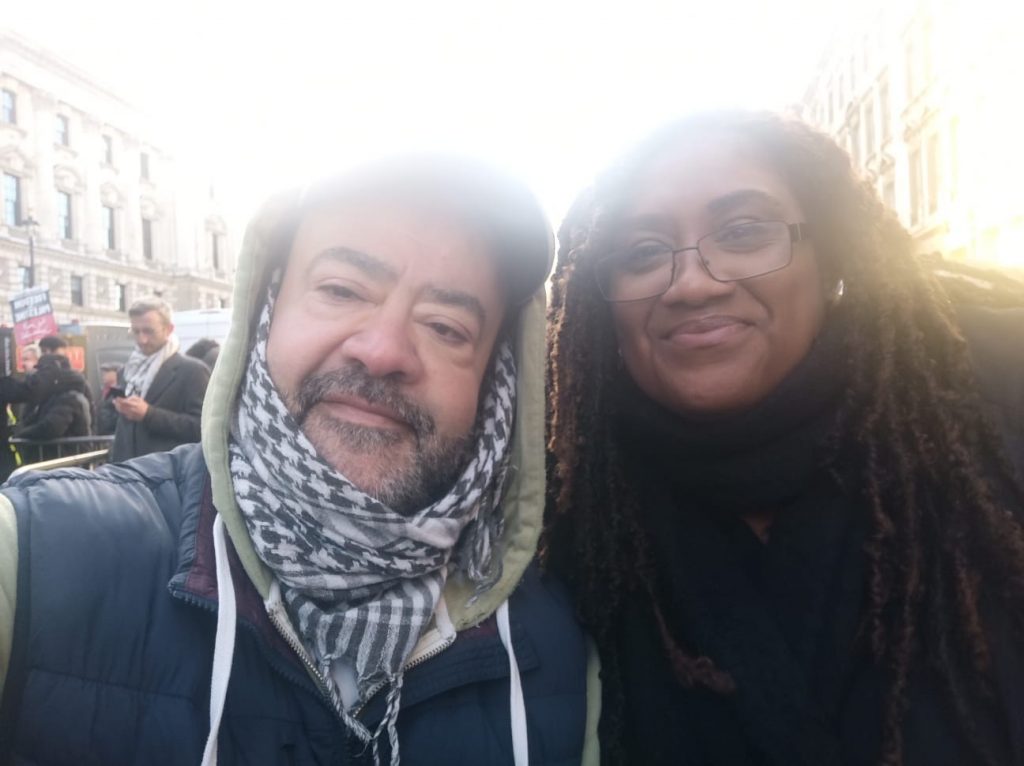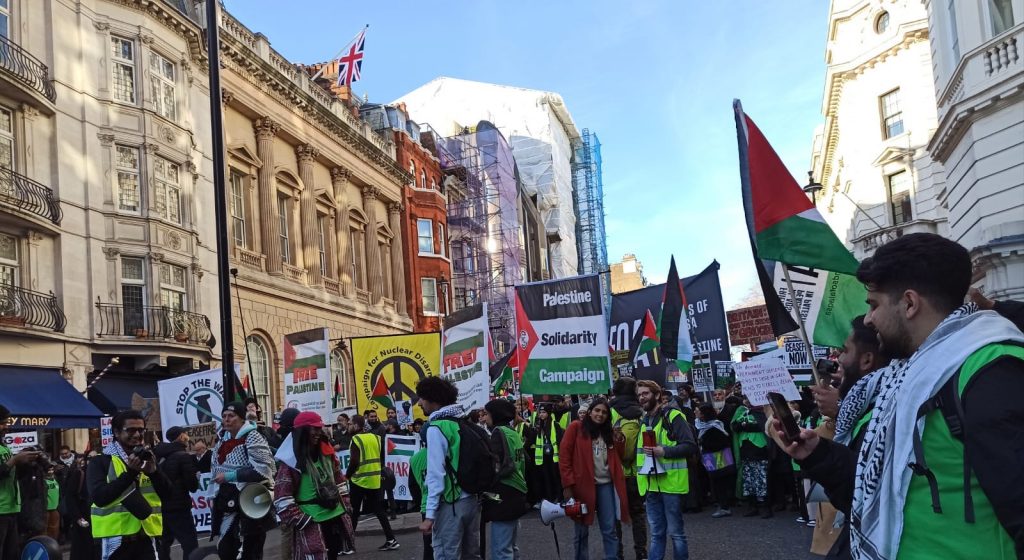British Turks have joined the huge chorus of criticism levelled at the mass of MPs who abstained or voted against a motion in Parliament calling for a ceasefire in Gaza.
An amendment to the King’s Speech, tabled by the Scottish National Party (SNP), called for “all parties to agree to an immediate ceasefire” in Gaza.
The vote in the House of Commons took place on Wednesday, 15 November, with 293 MPs rejecting the SNP motion, while 125 MPs voted for it. A further 232 MPs abstained. Similar motions calling for a ceasefire were passed in the Welsh and Scottish Parliaments.
Most of the 293 ‘no’ votes (288) were Conservative MPs, who adhered to the Rishi Sunak government position. The remaining 57 Tory MPs, like the majority of their Labour colleagues, opted to abstain.
In contrast, every single Liberal Democrat MP, many independent MPs, and virtually all of the SNPs 43 MPs (two were tellers, so couldn’t vote) voted for the ceasefire motion, along with 56 Labour MPs who rebelled against their party line.
Servet Hassan “the UK Parliament has chosen to turn a blind eye to the slaughter of thousands of innocent civilians including babies, women and children”
Eight Labour shadow ministers and two parliamentary private secretaries either resigned or were sacked for defying the party whip by backing the ceasefire motion. They included Jess Phillips, the shadow minister for domestic violence, Yasmin Qureshi, shadow women and equalities minister, and Afzal Khan, shadow business minister.
Labour backbenchers to break rank with their leader included Edmonton MP Kate Osamor, Walthamstow’s Stella Creasy, and Bolton MP Imran Hussain, who is also the Chair of the All-Party Parliamentary Group for the Turkish Republic of North Cyprus.
CLICK HERE TO SEE HOW YOUR MP VOTED ON THE CEASEFIRE MOTION
Among the 525 MPs abstaining or voting against the ceasefire motion were the two MPs for Enfield, Bambos Charalambos and Feryal Clarke, Barnet’s Theresa Villiers, Chingford and Woodford Green MP Sir Iain Duncan Smith, Bethnal Green’s Rushanara Ali, Hackney South and Shoreditch’s Dame Meg Hillier, Lewisham West and Penge MP Ellie Reeves, her husband and fellow Labour MP for Leyton and Wanstead John Cryer, Old Bexley and Sidcup’s Louie French, Orpington’s Gareth Bacon, Romford’s Andrew Rosindell, Wood Green MP Catherine West, and Islington South and Finsbury MP Emily Thornberry.
The latest YouGov poll showed that 76% of the public wants a ceasefire. pic.twitter.com/E2sxkZsTJA
— Mukhtar (@I_amMukhtar) October 26, 2023
Labour leader insists not backing ceasefire was “doing the right thing”
Sir Keir Starmer, who was already under fire for suggesting on a radio interview last month that Israel had the right to cut off fuel, water and food supplies as part of its war against Hamas before rowing back from his comments, has been advocating for a “humanitarian pause”. This would allow for short temporary pauses to the fighting to allow humanitarian agencies to deliver aid into Gaza before the bombing of the beleaguered 2.5 million Palestinian population resumed.
For many, that option was unacceptable as it would mean many more innocent Palestinians would needlessly perish. Three quarters of the British public want a ceasefire, according to a YouGov poll on 19 October.
Fevzi Hussein: “You couldn’t get a cigarette paper between Labour and the Tories when it comes to the Israel-Gaza crisis”
Yet the Labour Party leader chose to remain in step with Rishi Sunak by maintaining that an immediate ceasefire was not in Israel’s interest in its war to eliminate Hamas, despite the heavy Palestinian causalities and widespread damage to homes and vital infrastructure, including hospitals and schools.
Even after more than a quarter of his 193 MPs refused to back him, Starmer insisted he was “doing the right thing”, stating immediately after the ceasefire vote last week:
“I regret that some colleagues felt unable to support the position tonight. But I wanted to be clear about where I stood, and where I will stand. Leadership is about doing the right thing. That is the least the public deserves.”
Keir Starmer is asked what his red lines are re: the genocide, with white phosphorous and bombing of “safe routes” mentioned. His weasel reply focuses entirely on Hamas and makes clear there are zero red lines for Israel. Absolutely sickening. pic.twitter.com/m0RLx1IMMZ
— C (@Obsayxx) November 3, 2023
Furious public backlash
As news about the outcome of the ceasefire vote circulated on social media, many people were incensed that the motion had failed to pass and that most Labour MPs had sat on the fence.
The furious public backlash saw the MPs who failed to back the motion be named and shamed, with their photos circulated on social media along with damning captions such as, “blood on your hands”.
128. Catherine West @CatherineWest1
Labour MP for Hornsey and Wood Green ABSTAINED in the vote for a ceasefire in Gaza.
You have blood on your hands. pic.twitter.com/qquw9pVo04
— Fatima (@fatimazsaid) November 17, 2023
179. James Cleverly @JamesCleverly
Conservative MP for Braintree voted AGAINST a ceasefire in Gaza.
You have blood on your hands. pic.twitter.com/uzdkCC34wa
— Fatima (@fatimazsaid) November 17, 2023
There have been angry meetings between MPs and their constituents, who have confronted them for condemning more Palestinians to their death, as well as protests outside constituency offices. Some MPs, such as Feryal Clark and shadow Welsh Secretary Jo Stevens, have had their offices vandalised.
Ertan Osman: “Labour’s stance on this matter can only be summed up as a betrayal, not only of their voters, but also of their own values”
The ugly scenes have prompted MPs to speak out against the intimidation and harassment they say they are facing over their choice not to back the ceasefire.
Posting a photo of the graffiti sprayed on her office, Feryal Clark wrote on X (formerly Twitter): “The cowards who sprayed graffiti on my office shutters, the police have the cctv footage, and the paint will be removed today. Next time, just try emailing !”
Speaking in defence of her Labour colleague, Harriet Harman posted on X: “People voted for @FeryalClark to be MP and no one should try and obstruct or intimidate her or her staff. This is an attack on democracy. I hope @metpoliceuk will take seriously. Solidarity with Feryal and her staff.”
People voted for @FeryalClark to be MP and no one should try and obstruct or intimidate her or her staff. This is an attack on democracy. I hope @metpoliceuk will take seriously. Solidarity with Feryal and her staff. https://t.co/QeMOYLa58f
— Harriet Harman (@HarrietHarman) November 22, 2023
“We have failed to save so many innocent lives”
The MPs’ push back has not diminished the strength of feeling amongst Britons, and particularly the 4-milllion strong Muslim community, who remain angry at the double standards displayed by the two main parties; while they refrain from condemning Israeli breaches of international law in Gaza, they did not hesitate to take strong action against Russian aggression and war crimes against Ukraine.
Many in the British Turkish community have also been highly critical of the MPs who failed to support at immediate ceasefire.

Hoca Husayn Hashim El Bakayi – the UK’s leading Turkish Cypriot pastor – told T-VINE that all politicians had a duty to act “for the sake of humanity.”
“After seeing the horrific mass killings of children and defenceless women in Gaza, the situation of their medical institutions and attacks on hospitals, and the cutting off of electricity and all basic needs for Gaza’s population of 2.5 million people, I was extremely disappointed by the vote in the UK Parliament.”
“We have failed to save so many innocent lives,” Husayn Hoca added.
The chair of the British Turks Solidarity Platform, Servet Hassan was also very critical of the mass of MPs who rejected the SNP motion:
“The Turkish community in the UK has been watching the developments in Gaza with horror. It is morally reprehensible and disappointing that the UK Parliament has chosen to turn a blind eye to the slaughter of thousands of innocent civilians including babies, women and children, allowing the ethnic cleansing of young and old to continue.
“Backing an immediate ceasefire is the only humanitarian thing to do and will also help to pave the way for the release of the hostages. The double standards shown in this vote is deeply disturbing.”
Trade unionist and Bandofla podcaster Fevzi Hussein, who has been a regular on the big pro-Palestinian marches in London, said:
“Labour leader Keir Starmer has found himself in a pickle all of his own making. The inept response of the Labour leader has sent strong signals to the huge Muslim community in the UK that Labour is not a party for them. I refuse to vote Labour under his leadership. You couldn’t get a cigarette paper between Labour and the Tories when it comes to the Israel-Gaza crisis.”


While the Conservative position was expected, many traditional Labour voters were shocked at the party’s continued lack of concern over Israel’s disproportionate use of force, which has left at least 15,000 people dead in Gaza since 7 October, over a third of them children. Some 1.5 million people have been displaced, and many are on the brink of starvation or at risk of death from disease due to a lack of clean water, sanitation, medical supplies and fuel.
Ertan Osman, who is one of the organisers behind Turkish Cypriots Against Genocide in Gaza, articulated what many in the group are feeling about Labour’s stance on the ceasefire vote.
Editor’s note: graphic images of injured Palestinians
“Seeing Conservative politicians vote against the ceasefire in Gaza in the UK Parliament was disappointing, but at the same time expected. However, so many abstentions from Labour Party MPs was totally heartbreaking, as it is because of their silence that this genocide against the Palestinian civilians of Gaza is being allowed to continue.
“Considering that so many people who openly oppose the Israeli government’s war crimes, be they from the Muslim community or otherwise, vote Labour in the elections, Labour’s stance on this matter can only be summed up as a betrayal, not only of their voters, but also of their own values.” (read Ertan’s full comment here)
Why has Israel’s response been so harsh?
Israel launched its military offensive of Gaza in response to Hamas’ “unprovoked and vicious” terror attack on southern Israel.
On 7 October, Hamas operatives breached the security wall separating Gaza from Israel and went on a killing spree. They entered the homes of Jewish communities and shot people of all ages, burning their homes, while some raped women, and also mutilated the bodies of their victims. Hamas’ barbaric actions constitute crimes against humanity.
In all, 1,210 people were murdered – the single largest massacre of Jews in a single day since the Holocaust. Alongside the brutal deaths and injuries to thousands more, Hamas also kidnapped 236 people, among them weeks old babies and elderly citizens.
These events have left all of Israel and the Jewish diaspora deeply traumatised, and the Israeli government’s devastating response in Gaza is seen by its population as primarily self-defence and the need to recover their hostages, but also – for some – as vengeance.
Hamas – whose leaders initially sought to deny they had killed any civilians, now maintain they would do the same again if the opportunity presented itself.
The Israeli government has vowed to “eliminate Hamas”, a goal backed by the overwheming majority of its citizens. Its military, the Israeli Defence Force (IDF), claims civilian casualties in Gaza are an unavoidable by-product of war. For many neutral critics, the indiscriminate bombing goes beyond self-defence and smacks of collective punishment, which is illegal under international law.
The IDF have said they have tried to warn Palestinians in Gaza to move away from areas that they will be bombing, but even supposedly safe humanitarian corridors and locations in southern Gaza have been shelled. The ability of Palestinians to receive IDF messages have been further compounded by the lack of internet and power in Gaza.
Even worse is the genocidal intentions of many in Prime Minister Benjamin Netanyahu’s government. They have openly expressly stated they wish to destroy Gaza (Agriculture Minister Avi Dichter, who said ‘Gaza Nakba’), another said “nuking” Gaza was an option (Israel’s Heritage Minister Amichai Eliyahu), while a third (Finance Minister Bezalel Smotrich) advocates the “voluntary immigration of Gaza Arabs to the countries of the world”.
Far-right extremist Itarmar Ben-Gvir, who is National Security Minister, wrote on X last month that, “The only thing that should enter Gaza as long as Hamas doesn’t release the hostages it holds is not a gram of humanitarian aid, but hundreds of tons of explosives from the Air Force.” Indeed, many in the Netanyahu government regard the Palestinian territory as a part of Israel.
Many legal and human rights experts believe these intentions put the actions of the Israeli government not only in breach of international humanitarian law, but also constitute war crimes and a genocide against Gaza.
What could the UK do to stop Israel’s disproportionate use of force in Gaza?
Many British MPs have tried to claim that Israel would not heed a ceasefire vote in the UK Parliament and that there is little they can currently do to influence events in the Middle East.
That attitude jars with many Britons given the country’s role and status in the world, and its historic ties to the land occupied by Israel and Palestine, which Britain ruled over from 1920 to 1948.
The UK is a close ally of Israel, which means it also can be a critical friend. While such criticism may happen behind closed doors, public statements can indicate the mood between the two states.
Since the outbreak of the conflict, Rishi Sunak and his government have shown unwavering support of Israel and for several weeks into October failed to show any regard for the huge loss of life in Gaza. Such unconditional support may well have encouraged more Israeli aggression instead of checking it.
UK Foreign Sec James Cleverly refuses to condemn Israel cutting off water, power & food to Gaza. The UK Govt is meant to support international law. But it believes in selectively interpreting it: one rule for Hamas terror; another for Israeli terror. pic.twitter.com/pxp8XlG6pl
— Gerry Hassan 🇺🇦 (@GerryHassan) October 9, 2023
London is also inconsistent when it comes to political recognition. While it has recognised Israel since 1948, it has refused to extend the same recognition to Palestinians despite claiming it wants a two-state solution.
The UK could help create more parity between the two nations by formally recognising the State of Palestine within the internationally agreed 1967 borders, as over 130 members of the United Nations have already done so, including nine members of the European Union. This would add more pressure on Israel to recognise its Palestinian neighbour’s territorial rights.
As a permanent member of the United Nations Security Council, the UK has unfortunately used its power and right of veto to prevent or water down motions critical of Israel’s actions in Gaza and demands from the international community for an immediate cessation of hostilities.
For a country so keen to advance human rights and values around the world, the UK’s stance in the UN has greatly diminished Britain’s standing globally and underlined the double standards at play.
The myth of western humanity & democracy died in Gaza. pic.twitter.com/3yBqykC4LM
— Jairo I Fúnez-Flores (@Jairo_I_Funez) November 25, 2023
As a signatory of the Rome Statute that established the International Criminal Court, the UK can also refer both Israel and Hamas to the ICC to investigate whether war crimes are or have been committed by them. Many other states have already taken this step.
Strikingly, the British government was one of the first to refer Vladimir Putin and Russia to the ICC after their invasion of Ukraine. For many, the failure of the UK to do the same given the dire events in Gaza smacks of hypocrisy.
Another important fact to note is that the UK is not a passive bystander here. It has taken a more active role in the Gaza War by flying a large number of military transport flights to Israel since the outbreak of the conflict.
The first of at least 17 RAF flights started on 11 October from the RAF’s main military base in Brize Norton, Oxfordshire. Many more transport carriers have departed from Akrotiri in Cyprus. The Ministry of Defence denies the flights have carried “lethal aid” to the Israelis but refuses to state what the military transport flights have been for.
These RAF flights leave the British government open to accusations that it is complicit in events in Gaza.
The UK could also stop arming Israel. According to Declassified, since the Conservative Government was elected in May 2015, the UK has licenced over £472m worth of arms to Israeli forces. This includes licences covering components for aircraft, helicopters, drones, bombs, missiles, military technology, armoured vehicles, tanks, ammunition, and small arms.
Main image, to, left to right: Sir Keir Starmer, Feryal Clark, & Sir Iain Duncan Smith




